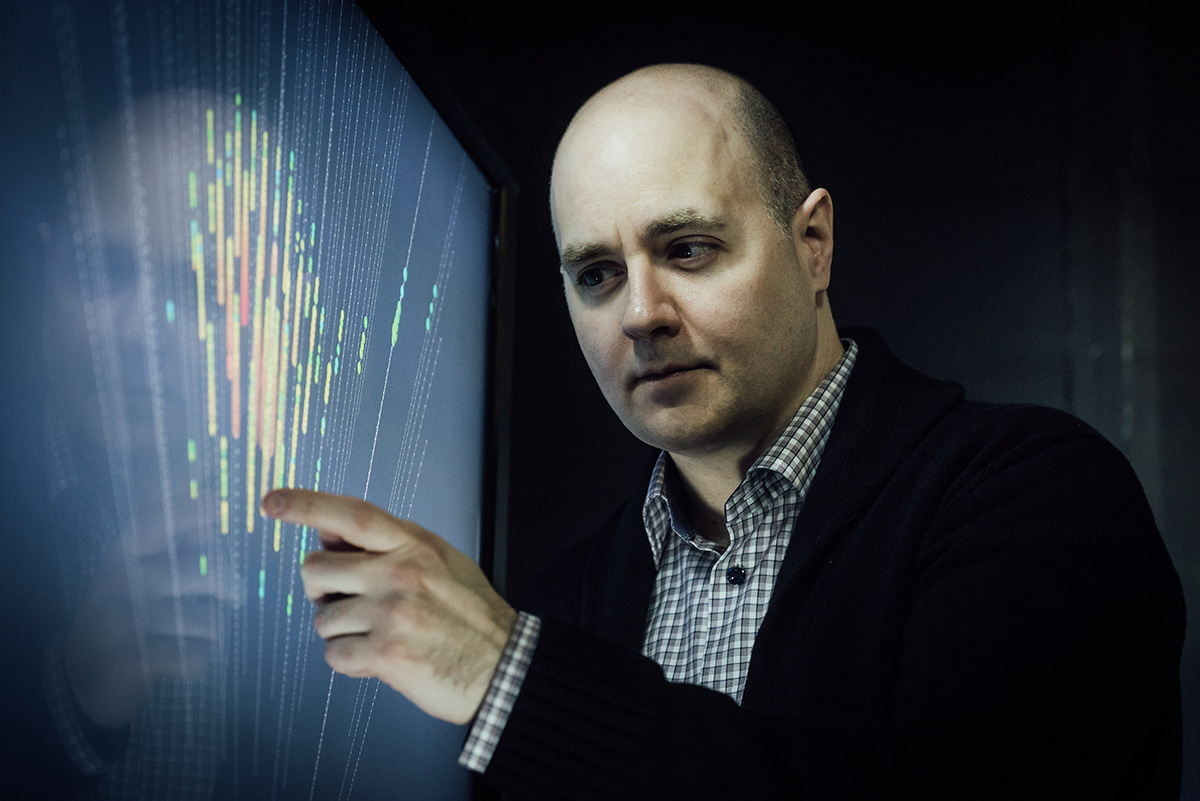
Darren Grant will be awarded the E.W.R. Steacie Memorial Fellowship from the Natural Sciences and Engineering Research Council of Canada for his research on neutrinos.
As someone who studies one of the most enigmatic particles in the universe, Darren Grant, Canada Research Chair in Astroparticle Physics, is no stranger to scientific surprises. Any discovery about his subject matter--neutrinos--always uncovers something new and often completely unexpected. Perhaps one of the greatest scientific mysteries, neutrinos are second only to photons in abundance in the universe. These neutral subatomic particles rarely interact with matter and are extremely difficult to detect.
"Part of the mystique is that there's a particle out there that just happily passes through you and isn't even aware of your existence or vice versa. There's ten billion neutrinos passing through your thumbnail every second." -Darren Grant
Grant's most recent discovery is much more personal in nature. Today, he will be awarded the E.W.R. Steacie Memorial Fellowship from the Natural Sciences and Engineering Research Council of Canada (NSERC). One of NSERC's most prestigious awards, the Steacie recognizes highly promising young researchers and helps accelerate their careers to the next level. Grant plans to use the fellowship to pursue new ideas for photosensors to gear up for the next generation of neutrino detectors.
"The heart of what we proposed is a long-term vision for the future of the field of astroparticle physics," Grant explains. "The point is to continue to tease out the unknowns about neutrinos to better understand our universe. Among other discoveries that await, there is the possibility we could finally explain the matter-antimatter asymmetry."
Grant conducts the majority of his research at the IceCube Neutrino Observatory, using the pristine ice at the South Pole as a medium for observing and recording the interactions of neutrinos.
Ghost particles
Momentum continues to build for the multi-billion dollar field, and Grant plays a key role in Canada's leadership on the global stage. Reflecting on what it is about the neutrino that has captured society's collective consciousness in recent years, Grant thinks it is the fact that neutrinos don't behave like anything else in the known universe.
"Part of the mystique is that there's a particle out there that just happily passes through you and isn't even aware of your existence or vice versa. There's ten billion neutrinos passing through your thumbnail every second. They affect how the universe became what we see today, but they're still this ghost. I think that captures our imagination."
Award-winning research
Next to photons, neutrinos are the most abundant particle in the entire universe. The recent surge in public awareness for this unique fundamental particle has been aided by Canadian Art McDonald's Nobel Prize win in 2015 and the 2016 Breakthrough Prize in Physics being awarded for the Sudbury Neutrino Observatory (SNO) experiment, where a global team of physicists, including Grant, discovered that neutrinos change flavours and therefore have mass.
Public awareness will undoubtedly continue to draw people to the field. The global growth spurt of the field is being experienced more locally at the University of Alberta, where the astroparticle physics group, currently with 32 members including five professors, seven postdoctoral fellows, 10 graduate students, and 10 undergraduate students, is expected to grow by more than 30 per cent in the next year.
Comparing his own journey as an undergrad in astronomy to his graduate work with the SNO experiment, Grant muses that stands in stark contrast to that of the students he now mentors. "I look at the students today, and they're so driven. They have these wonderful plans, and they know exactly what they're going to do. My career is nearly the complete opposite of that so far. It's been much more happenstantial."
With NSERC's endorsement of his career, we'd say so far, so good. Congratulations Darren!
Grant joins an illustrious list of former Steacie fellows in the University of Alberta Faculty of Science, including fellow physicists Mark Freeman (1999) and Andrzej Prus-Czarnecki (2006), chemists Jillian Buriak (2007), Dennis Hall (2008), Wolfgang Jaeger (2002), and Todd Lowary (2006), mathematician Alexander Litvak (2011), and computing scientist and Faculty of Science Dean Jonathan Schaeffer (1998).